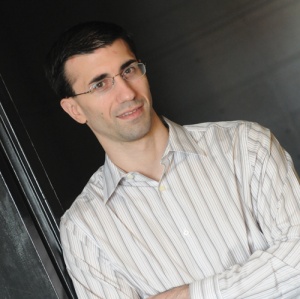Marianetti Awarded $850,000 FAME Research Grant
 Chris Marianetti, Assistant Professor of Materials Science and Engineering, was recently awarded a $850,000 grant for his contribution to the Function Accelerated nanoMaterial Engineering (FAME) center.
Chris Marianetti, Assistant Professor of Materials Science and Engineering, was recently awarded a $850,000 grant for his contribution to the Function Accelerated nanoMaterial Engineering (FAME) center.
This $30M center, jointly funded by DARPA and the Semiconductor Research Corporation (SRC), is lead out of UCLA. Other participating universities include: Columbia, Cornell, UC Berkeley, MIT, UC Santa Barbara, Stanford, UC Irvine, Purdue, Rice, UC Riverside, North Carolina State, Caltech, Penn, West Virginia and Yale.
"The new Focus Center (FAME) aims to incorporate nonconventional materials and nanostructures with their quantum properties for enabling analog, logic and memory devices for beyond Boolean computation. The Center's main focus is nonconventional material solutions ranging from semiconductors, dielectrics and metallic materials as well as their correlated quantum properties. The mission of FAME is to create and investigate new nonconventional atomic scale engineered materials and structures of multi-function oxides, metals and semiconductors to accelerate innovations in analog, logic and memory devices for revolutionary impact on the semiconductor and defense industries." (FAME website)
Industrial corporations including IBM, Intel, Micron, and others have recognized the relevance of the techniques that Marianetti has helped develop over the past decade which had been previously confined to predominantly fundamental scientific inquiry.
"I was brought into this center for my expertise on predicting the behavior of transition metal oxides from the first-principles of quantum mechanics, particularly those displaying strongly correlated electron behavior," said Marianetti. "Strongly correlated electron systems display a dizzying array of exotic properties including high temperature superconductivity, colossal magnetoresistance, Mott transitions, and many others. There is hope that a new generation of electronic devices could be realized by harnessing the sensitive properties of strongly correlated electron systems. Unfortunately, our "standard theory" of materials science, Density Functional Theory (DFT), sometimes qualitatively breaks down when addressing strongly correlated electron systems. Fortunately, there are more advanced theories, such as the dynamical mean-field theory (DMFT), which can remedy the shortcomings of DFT and unlock the behavior of strongly correlated systems. One of the major focus points of my research is developing the DMFT method and merging it with DFT to create a robust hybrid theory DFT+DMFT which will give us predict power over strongly correlated electron systems. Due to these theoretical and computational developments, we will be able to design new materials at the atomic scale and work with experimentalists to realize novel phenomena and functionality."
